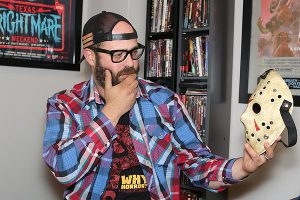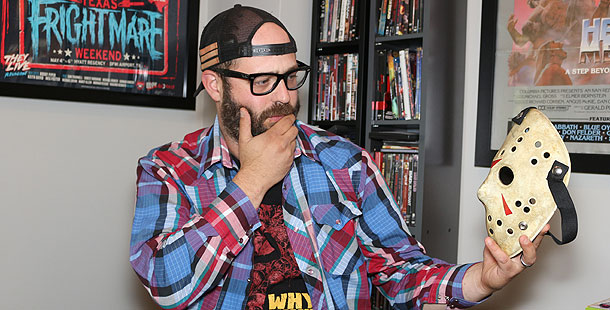
Writer-comedian travels the world to explain why people like to be scared
Tal Zimerman couldn’t tell you what he would do in the event of a zombie apocalypse.
The subject of Why Horror? sits in the dining room of his Bathurst and St. Clair home, his brow furrowing at the very thought of the question.
“Well, now that I have a family things have taken on a bit of a different turn, but generally my answer to that is I would find a bunch of heroin and go die in a closet somewhere,” he says, with a hearty laugh. “I don’t know what I’d do. Just stay as quiet as possible?”
Zimerman’s roots are in comedy, but his passion is horror, which explains why he’s spent the last year and half sating his own curiosity with uncovering why people like to be scared. He calls the pursuit “an inexplicable draw.”
He says he doesn’t make a habit of explaining his tastes.
“I just like things and then I take part in them,” he says. “I don’t necessarily think why.”
That perspective, he said, led to a discussion where executives at Don Ferguson Productions thought it would be “a real cool idea” for a documentary.
Zimerman had worked with Don Ferguson Productions in the past, on Comedy Bar. The Royal Canadian Air Farce alum Ferguson plays executive producer to Zimerman’s monster-in-chief on Why Horror.
The question posed intrigued them, Zimerman admits, so off he went, exploring the culture of horror from cave art to video games, both in Toronto and abroad.
“Why do I like to be scared? Why do we love horror movies? Why do I treat it like a religion? I wake up every morning and horror is front of me, and I go to bed. My kid likes it. So, that became the basis for a feature-length documentary: why we like to be scared.
“Just to add,” he says, “it was a very genuine experience for me, finding out why I like all this stuff and on what level, psychologically and emotionally, it hits me.”
Indeed, Zimerman had his head literally read by an FMRI machine, and both he and his mother were wired for sound while watching gore on screen.
“Our stress responses, heart rate, blood flow were all monitored while watching clips side-by-side,” he says. “The idea being, what happens when you take a horror fan and someone who hates horror, put them in a room together to watch disgusting, horrifying clips, what the fluctuations in their vital statistics are.
“And it was not what you would think it is.”
Though Zimerman, also a journalist, won’t reveal the results of the findings (you’ll have to find out when you watch the 90-minute feature on Oct. 28, or at the Toronto After Dark Film Festival), he wants people to give the genre, and all its tropes, a chance.
“I hope that [Why Horror?] inspires people to take a closer look at things they’d normally write off as trash,” he shares. “Horror is definitely one of those things that people don’t take seriously or as a cause for serious and close examination.”
He traces a change in public perception of the genre to the 1970s and ’80s, when people started to take a closer look at it, “and now you find university courses on zombies.”
“You find the Center for Disease Control making plans for what to do if there’s a zombie apocalypse and people looking at the socio-political underpinnings of the vampire,” he says. “It blows my mind, because I grew up loving horror movies, and it just felt good to watch [them].”

